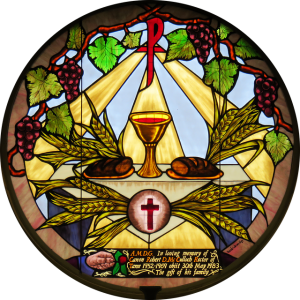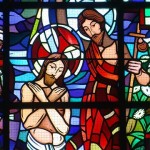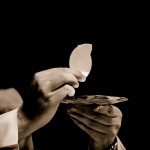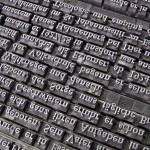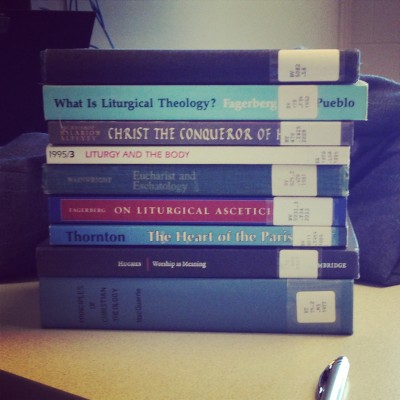It is quite fortuitous, for me, that I have been able to preach on Ash Wednesday and Maundy Thursday this Lent. It’s probably not so fortuitous for you that the A-Team called in the B-Team, but I’m grateful because these two services are two very important signposts in Redemption’s Journey. My word to you on Ash Wednesday was the before our cry could be “Hosanna (last Sunday),” “Crucify him (tomorrow),” or even “He is risen (this Sunday),” we must first exclaim, “Sanctify us, sanctify us.” I’ve got news for you: nothing has changed since I first said that to you.
Our Collect for today is of the utmost importance as it provides the necessary link between this liturgical service and the institution of the Lord’s Supper by Jesus. John’s Gospel account, as was rightly noted in Cynthia’s weekly email last week, does not include the institution narrative as part of the Last Supper. It is not that John is suggesting this didn’t take place but that he felt it more important to relate the breaking of bread with the feeding of the multitudes in John 6.
Our encounter with the Living Word would be incomplete tonight if we didn’t draw the significant connections between Passover and Eucharist, between Communion and the washing of the disciples’ feet. As most of you well know, I am passionate about liturgy and the sacraments of the Church and I hope in these few minutes together that we will be able to unpack this holy feast.
Before I go any further, I am afraid that I may leave some of you disappointed. The Collect opts for the word “mysteries” instead of “certainties” or “philosophical proofs.” Tonight will not be an occasion for us to make absolute and concrete claims about the inner working’s of the Sacrament; in fact I find such conversation to be utterly unhelpful and beyond the scope of orthodox Christian theology. I will not be telling you how or when the bread and wine become the Body and Blood or where Jesus is present. Rather, and more importantly, I hope that we focus on the extravagant love (CPB) and overwhelming grace of God, the tangibility of the elements and the reality of Jesus’ presence in our sacramental and liturgical worship.
We begin this evening with Israel.
Actually, it would be more precise to say that we begin with the Hebrew children in Egypt. By this point in the story, Moses has already fallen from grace in Pharaoh’s home, he has come back to Egypt with a staff and the claim that I AM wants his people released from slavery into freedom. Pharaoh’s heart has hardened each and every time and 9 plagues have thus been inflicted upon the Egyptians. Now is the night of the 10th and final plague, the killing of the firstborn children of Egypt and the passing of YHWH over the houses of the Hebrews.
Our author gives us great detail about YHWH’s commands concerning their Passover supper. Each food item now has symbolic meaning in the retelling of this story, but we don’t have time to get into that. This is the meal that Jews around the world still eat annually on Pesach. As the Hebrew children ate this inaugural meal in Egypt they were awaiting deliverance. There adherence to YHWH’s command was evidence of their faith in I AM. Now as Jews everywhere share in this meal it is the making real of the first and true Passover.
Notice YHWH’s words at the end of this passage: “This day shall be a day of remembrance for you. You shall celebrate it as a festival to the Lord; throughout your generations you shall observe it as a perpetual ordinance.”
Remembrance. Celebrate. Observe.
Sounds familiar. Sounds a bit like Sunday, right? It sounds like the Eucharist.
11 days ago, Ellis preached a beautiful sermon in which he highlighted Eucharistic worship. Do you remember the funny Greek word he taught as part of this study? Anamnesis. If you’ll recall, Ellis talked about the cognitive power of smell connected with memory. I’m sure that you can still remember the smell of your mother’s chocolate chip cookies, or your baby’s head, or many other important things. Perhaps it is the aroma of bitter herbs…perhaps….
Anamnesis is the crashing in of the past into the present, it is the dragging of a previous event into the here and now and it makes the past real, tangible, palpable.
For Jews, Passover is a moment of anamnesis. Their language is clear: this is the night. The youngest at the table now asks, “Why is this night different from all others?” They remember dangerously, powerfully, even evocatively, retelling the story just as if they were the ones fleeing Egypt—and in one sense they are. This passage is included on this high liturgical evening because once cannot separate Passover from Communion, Pesach (Jewish) from Pascha (Christianity).
In John’s passage we see the washing of the disciple’s feet by their Teacher, our Lord. This washing took place within the context of the Passover meal. It is not that our lectionary compilers were clever and decided to connect Passover with Last Supper, but that Jesus’ movement toward the Cross was utterly intentional—it was no coincidence that the Jewish Passover and the Institution of the Eucharist were connected. Let’s remember all that we discussed a few minutes ago about the Passover—let that meal permeate your senses, bring that event into the present through anamnesis and understand the power of Jesus’ actions and words.
Jesus takes off his outer garment and wraps a towel around his waste. He assumes the position of a servant, washing the crusty, dusty, dirty feet of those who are his followers. Peter, oh our friend Peter, isn’t having any of this. [There’s a brilliant moment in the original Star Wars when Admiral Akbar says in all of his squidly glory, “It’s a trap! I imagine Peter was thinking something to this extent.] Peter cannot, no he will not, be served by Jesus. He recognizes rightly that in one sense that this is beneath Jesus. However, he misses the point entirely: Jesus is the inversion of power as was known in Rome. Caesar would never ride in on a donkey, would never wash his servants’ feet, would never die at the hands of Roman soldiers on a Roman execution device.
Peter does eventually clue in and then asks for his whole body to be washed. In typical Petrine fashion, Peter’s zeal before the Lord is intoxicating. He may not always get the answer right but he’s passionate.
Here, on this most holy of nights for Israel, Jesus washes his disciples’ feet and gives them a new meal, a new meal that is still part of the old meal. Here we see the forever connection between Passover and Cross, between covenant and Kingdom, between Israel as she once was and Israel as she was always intended to be.
It’s the apostle Paul who points us to the connection between the night Jesus was betrayed and the Institution of his holy meal. That Paul would include this in one of his earlier letters is evidence that the oral and liturgical traditions of the early church were vibrant and effective. Notice the words Paul uses—while we don’t have them as part of our text in John, all you have to do is look at Matthew, Mark, and Luke and notice that it is an exact re-presentation (with only a minor difference here or there). Paul is exhorting the nascent church to follow the example of her Lord and to commemorate and celebrate him every time she gathers together.
SO what?
- Ascent and return. Fr. Schmemann—if you’re friends with me on FB then you’ve seen a lot of him lately—has a great framework for viewing the Eucharist. He describes it as “ascent” and “return” and this movement is profound. The Eucharist is first and foremost “ascent” to the throne room of Christ, to his presence in the heavens at the right hand of the Father. We mark this most noticeably when we say, “Holy, holy, holy Lord” after the priest prays, “Joining our voices with angels, and archangels and all the company of heaven…” Where exactly did you think you were lifting your heart when you said your were lifting them up to the Lord? J
But like Israel who enjoyed her Passover meal, like Moses atop Mt. Sinai, like Peter, James, and John atop the Mount of Transfiguration, we are not yet meant to stay ascending forever. Our call is to return—to return to the lives we have been given and to invite others to participate in Eucharistic living. There can be no ascent in this sacrament without a return, likewise we cannot return without the sure knowledge that we will again be in his presence soon.
- Holy mysteries are given to the holy people. YHWH redeemed His chosen people that they might worship him in the desert. Jesus gives his disciples a meal and a new commandment that they might follow him and make him known through love. Your holiness is not of your own making; it is a gift from God as well. The gift is given freely—at least it’s free to you—with no strings attached. But the reception of the gift calls us to a life of gratitude and a life of loving mission.
Why are we calling these gifts of Bread and Wine, mysteries? For some of us here tonight is it anathema to consider Body and Blood. We grew up in church settings where it simply was not discussed or it was dismissed out of hand. Or, we have this desire to try and concretely understand when and how in the service the elements change. But what if we tried something? What if we tried to take Jesus at his word? Scandalous though it may be, our Lord did indeed say that this was his Body and his Blood. Rather than trying to argue without him or set up philosophical and anatomical boundaries for such a thing, maybe we can just embrace mystery. Bread and wine become body and blood in a mysterious, real, and powerful way as we gather together around the Lord’s Table. This is a holy meal. No, this is the holy meal.
But that’s only half of the answer; the other half has to do with you. We have assembled here today as the Church. We have joined ourselves to the memory of Israel walking out of Egypt, we have joined ourselves to the meal in the Upper Room with Jesus, we have participated in the washing of the feet, and we have seen the earliest liturgical witness of the Church. In short, we have remembered dangerously and we hope boldly. We are given the gifts, the mysteries because we are God’s holy people. We have been sanctified through Jesus. The Lord has heard your cry of “Sanctify us, sanctify us” and you have been washed through the baptismal waters. The holy meal then is a sign of your inclusion in God’s family, it is nourishment for the road known as Christian discipleship, and it is an assurance of his holiness permeating creation and our lives.
- New commands: love one another. Maundy is the English rendering of the Latin wordmandatum novum meaning mandate or command. In this passage we find a new command from Jesus to his disciples: love one another. However, the Institution of the Lord’s Supper can and should also be taken as a command. It is a command of our Lord to do likewise as we gather together, to celebrate this meal and remember him. Ultimately love and table cannot be separated. Jesus expresses his holy love for his disciples first by washing their feet and then second by sharing with them a holy meal in a new context. So shall it be with you. The command hasn’t changed: love others and live eucharistically.

